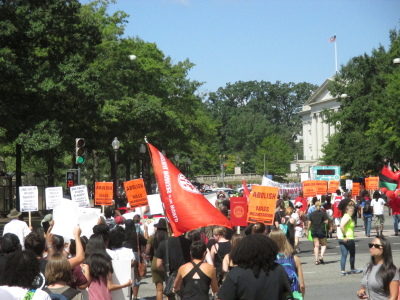
Millions for Prisoners March on DC

19 August 2017 – Hundreds rallied outside the White House today for the “Millions for Prisoners’ Human Rights March.” The event was organized by U.$. prisoners and outside groups to focus on the issue of the 13th Amendment, which allows for the slavery of convicted felons in the United $tates. During the march to the White House, the most common signs were: “Abolish Mass Incarceration”, “End Racist Prison Slavery” and Industrial Workers of the World membership cards. The latter were hard to read for the casual observer and did not reinforce the message of the march. There was one red, black and green flag, and representatives of the Republic of New Afrika in attendance.
While more than half of the participants were local, people from many states were in attendance, including New York, Pennsylvania, Florida, South Carolina, Louisiana, Alabama, California and even Alaska. The crowd was a mix of movement elders, formerly incarcerated people, self-described “socialist” organizations and many youth for whom this was their first participation in the prison movement.
Last weekend’s neo-nazi march, and murder of a young womyn, in nearby Charlottesville, Virginia was a motivator for a number of people to come out today. Some were there because of prisoners who had told them about the rally and asked them to participate. On the one hand this demonstrates the ability of prisoners to provide leadership to people on the outside. But these people were reachable by prisoners because they were involved in the movement already and the misnamed “Millions” for Prisoners rally proved the goals of the organizers to be a bit loftier than what was achieved.
In contrast to the hundreds in D.C., the so-called “Free Speech” rally in Boston today brought out tens of thousands of counter-demonstrators. Of course, they had the benefit of free advertising from all of the corporate news networks. The sight of hundreds of torch-wielding white men marching, chanting Nazi slogans, last weekend was rightfully jarring to many. Yet, innocent Black and Brown men are much more likely to die at the hands of the police or prison guards at this time than at the hands of a neo-nazi (that isn’t employed by the state).
“Prisoner Lives Matter!” was one chant that rang true in D.C. For if there is any group whose lives are at risk, and whose unnecessary deaths receive little attention, in this country more than New Afrikan people in general, it is prisoners.
People at the march reported that some prisons had visiting shut down or were on lockdown today to prevent any group demonstrations on the inside. This is another example of why MIM(Prisons) thinks the First Amendment is a more important battle front than the Thirteenth. Just the idea that prisoners might organize a protest is enough to trigger state repression. Organized prisoners are the lynch-pin to a meaningful prison movement, so the right to organize must be at the forefront.
When this correspondent asked participants what the most important issue in the prison movement was, many weren’t sure because they were new to it. Many had a hard time picking just one issue because there are so many things wrong with the U.$. injustice system. But the one response that was more popular than ending slavery in prisons, was the disproportionate arrest, sentencing, imprisonment and mistreatment of oppressed nations. While almost always phrased as “race” or “people of color”, it does seem that the national contradiction is at the heart of what people see as wrong with prisons in the United $tates. Even the focus on the 13th Amendment was regularly tied to the history of slavery of New Afrikans by speakers. One speaker called prisons the “new plantation”, which is true in that they were both institutions to control the New Afrikan semi-colony. But one was an economic powerhouse fueling global imperialism, while the other is a money pit that the prison movement aims to make a liability to the imperialists.
Perhaps an even bigger distinction was in the answers given by recently imprisoned people. Their focus was on their struggles upon release and the needs of those recently released. One New Afrikan man talked about his mother dying while he was in prison and him not even knowing at first. He got the news in such a callous way he didn’t even believe it at first. To this day he has not figured out where his mother’s body is. Yet he has been out of prison for two years and is already working for the mayor’s office providing release support and doing motivational speaking.
It is a good thing that the state is doing more to provide services to recently-released prisoners. But we still need programs for those who dedicate themselves to changing the system. The state can’t provide that. And it can’t serve self-determination for the oppressed. There is much work to be done to build bridges to revolutionary political organizing for comrades being released all over the country. And ultimately, as the state knows and demonstrates, the only successful release programs are those that are led and run by releasees themselves.








